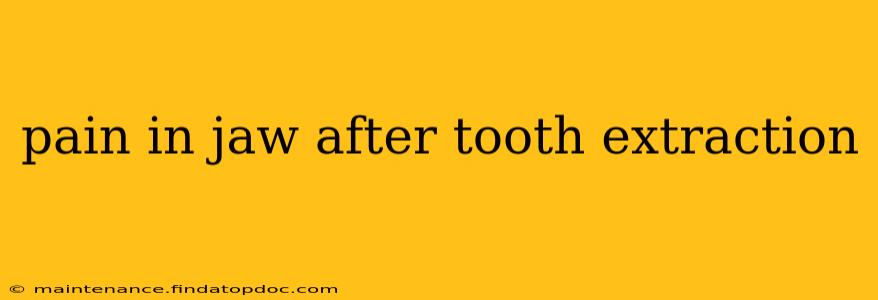Extracting a tooth, while a common procedure, often leaves patients with some degree of discomfort. While some mild soreness is expected, persistent or severe jaw pain after a tooth extraction warrants attention. This comprehensive guide explores the causes of this pain, effective treatment options, and preventative measures you can take. We'll address common questions surrounding this issue, ensuring you have a clear understanding of what to expect and how to manage it effectively.
What Causes Jaw Pain After Tooth Extraction?
Jaw pain following a tooth extraction stems from several factors, often working in combination. The most common causes include:
- Inflammation and Swelling: The extraction site undergoes a healing process involving inflammation. This natural response can cause significant pain and swelling, which can radiate to the jaw.
- Dry Socket: Also known as alveolar osteitis, this painful condition occurs when the blood clot protecting the extraction site dislodges prematurely. This exposes the underlying bone and nerve endings, leading to intense pain.
- Infection: Bacteria can enter the extraction site, resulting in infection. This can manifest as throbbing pain in the jaw, along with fever, swelling, and foul-smelling discharge.
- Referred Pain: Pain originating from the extraction site might be felt in other areas, like the jaw, ear, or temple. This referred pain is a common phenomenon.
- Sinus Issues (for upper teeth): Extractions of upper molars can sometimes damage the sinus cavity, causing sinus pain that can feel like jaw pain.
- Underlying Conditions: Pre-existing conditions like temporomandibular joint (TMJ) disorders can be exacerbated by the extraction, leading to increased jaw pain.
How Long Does Jaw Pain After Tooth Extraction Last?
The duration of jaw pain varies significantly depending on the complexity of the extraction, individual healing rates, and the presence of complications. Generally, you can expect some level of discomfort for the first few days, gradually decreasing in intensity. However, significant pain persisting beyond a week or worsening pain requires medical attention.
What Can I Do to Relieve Jaw Pain After Tooth Extraction?
Managing jaw pain effectively involves a multi-pronged approach:
- Over-the-counter pain relievers: Ibuprofen or acetaminophen can help control pain and reduce inflammation. Always follow the recommended dosage.
- Ice packs: Applying ice packs to the affected area for 15-20 minutes at a time, several times a day, can help reduce swelling and numb the pain.
- Rest: Adequate rest allows your body to focus on healing. Avoid strenuous activities and excessive talking.
- Soft food diet: Stick to soft foods that are easy to chew and avoid anything that could irritate the extraction site.
- Rinsing: Gently rinse your mouth with salt water several times a day to keep the area clean and prevent infection. Avoid vigorous rinsing.
- Prescription medication: Your dentist might prescribe stronger pain relievers or antibiotics if necessary.
Is Jaw Pain After Tooth Extraction Normal?
Some level of jaw pain after a tooth extraction is considered normal, especially in the immediate post-operative period. However, severe, persistent, or worsening pain is not normal and should be addressed by a dentist or oral surgeon.
When Should I Call My Dentist About Jaw Pain After Tooth Extraction?
Contact your dentist immediately if you experience:
- Severe or worsening pain: Pain that is not manageable with over-the-counter medication.
- Increased swelling: Swelling that is spreading or significantly increasing.
- High fever: A temperature above 100.4°F (38°C).
- Signs of infection: Pus, foul odor, or redness around the extraction site.
- Difficulty opening your mouth: Significant limitation in jaw movement.
How Can I Prevent Jaw Pain After Tooth Extraction?
While some discomfort is inevitable, several steps can minimize the risk of severe jaw pain:
- Follow post-operative instructions carefully: Adhering to your dentist's instructions is crucial for proper healing.
- Maintain good oral hygiene: Brush and floss gently around the extraction site, avoiding direct contact.
- Avoid smoking and alcohol: These can interfere with healing and increase the risk of complications.
- Eat a healthy diet: A nutritious diet supports the healing process.
This information is for general knowledge and does not constitute medical advice. Always consult with your dentist or oral surgeon for diagnosis and treatment of any dental concerns. They can provide personalized guidance based on your specific situation and ensure your recovery is as comfortable and efficient as possible.
